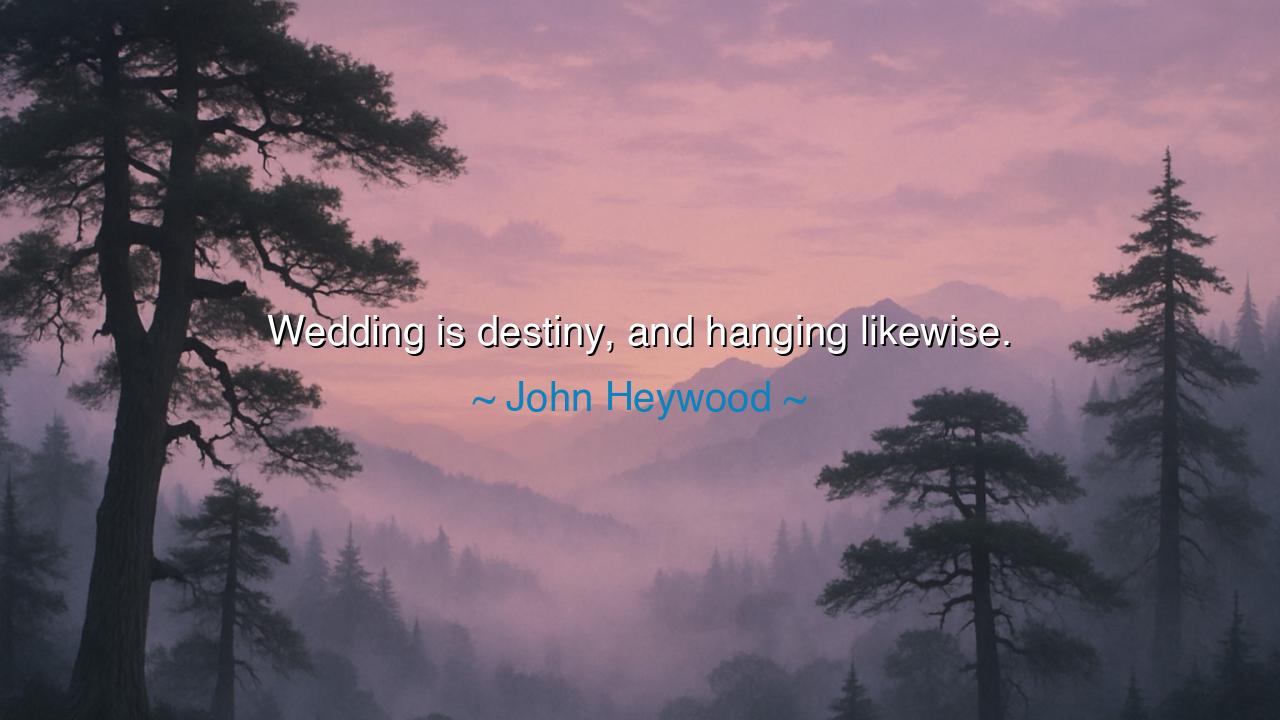
Wedding is destiny, and hanging likewise.






In this stark and poignant statement, John Heywood, the English playwright and collector of proverbs, speaks to the inevitability and weight of destiny in human life. By pairing wedding with hanging, he draws a grim parallel between the joys and the burdens that fate may bestow. Both are moments of profound consequence—one a union of hearts, the other an end of life—yet both share the common thread of being beyond the individual’s full control. Heywood’s words remind us that human existence is shaped by forces larger than ourselves, and that the paths of love and mortality are intertwined in their certainty.
The origin of this insight lies in the Elizabethan worldview, a time when life was often precarious and the whims of fortune were taken seriously. In the 16th century, marriage was not merely a romantic choice but a societal contract, often dictated by family, property, and duty. Likewise, execution was a public and inescapable reality for those who transgressed the laws of the land. Heywood’s pairing of these two extremes—joy and terror—serves as a reminder that human life is governed by the whims of fate, and that one must navigate both its blessings and its perils with courage and foresight.
History offers many vivid examples of this intertwined destiny. Consider the marriage of King Henry VIII to Anne Boleyn. Their union began with passion and hope, yet ended in tragedy when Anne was executed. What began as a wedding became inexorably linked to hanging, illustrating Heywood’s somber truth: moments of joy can be fleeting, and the paths of human lives are often shadowed by unforeseen consequences. The pairing of love and mortality underscores the fragile balance between fortune and misfortune in the human story.
Heywood’s words also carry a moral dimension, reflecting the Elizabethan belief in Providence and moral order. Every human act, whether entering into marriage or facing judgment, is a step along the path set by destiny. Just as a wedding binds two lives together under societal and divine witness, so too does execution signify the consequences of actions beyond oneself. In both cases, there is a call to heed wisdom and virtue, for the shape of one’s life is determined as much by prudence as by circumstance.
Ultimately, this quote teaches future generations to approach life with humility and reverence. Weddings and hangings alike are markers of fate’s authority, reminding us that some forces lie beyond our control. Heywood’s pairing urges us to cherish the joys of union while remaining ever-aware of life’s impermanence and the potential consequences of our choices. Let this teaching endure: in the dance of destiny, moments of love and loss are bound together, and only by understanding their inevitability can we navigate life with both courage and grace.






KA01 kim Anh
This quote walks the line between humor and fatalism. It’s almost as if Heywood is saying that both love and death are inescapable — just two different ends of the same destiny. I’m curious about the historical context: was he expressing his personal disillusionment, or was it a common view of marriage at the time? Either way, it’s a strikingly bold metaphor for its era.
QBQuoc Bao
I find this line intriguing because it reflects a very cynical view of marriage — as if it’s not a joyous union but a form of entrapment. Maybe Heywood was commenting on the constraints and expectations that society places on both marriage and punishment. Could it be that he was hinting at how both are binding institutions where personal freedom meets its limit?
HTHoaii Thuu
It’s fascinating how such a short statement can carry so much irony. By equating marriage with hanging, Heywood seems to be mocking societal norms that treat both as unavoidable outcomes of life. It makes me think about how destiny is sometimes used as an excuse for decisions we actually control. Do we really choose our fate in love, or do we just surrender to it?
VHvu ha
This quote is quite darkly humorous — comparing marriage to hanging suggests both are inevitable parts of fate, yet potentially perilous. I wonder if Heywood meant it as a critique of how people often enter marriage without choice or reflection. Is he implying that destiny can be both a blessing and a curse, depending on how one approaches it?